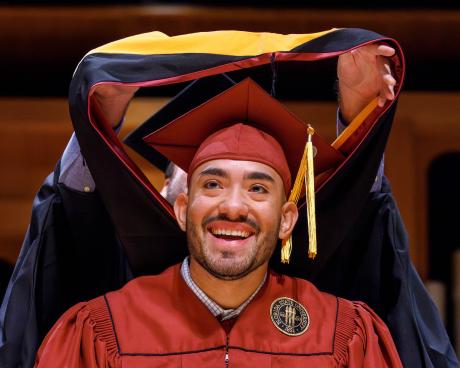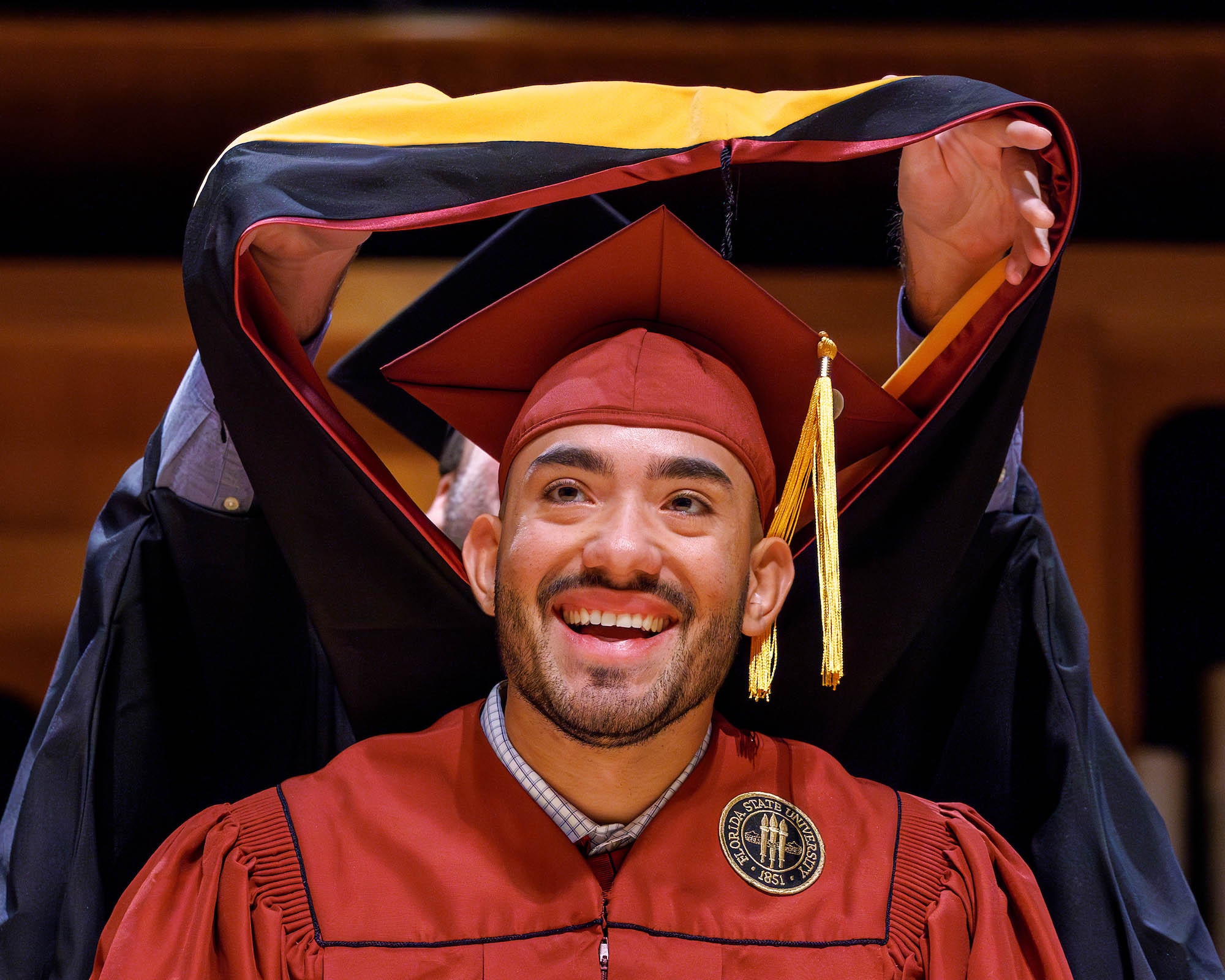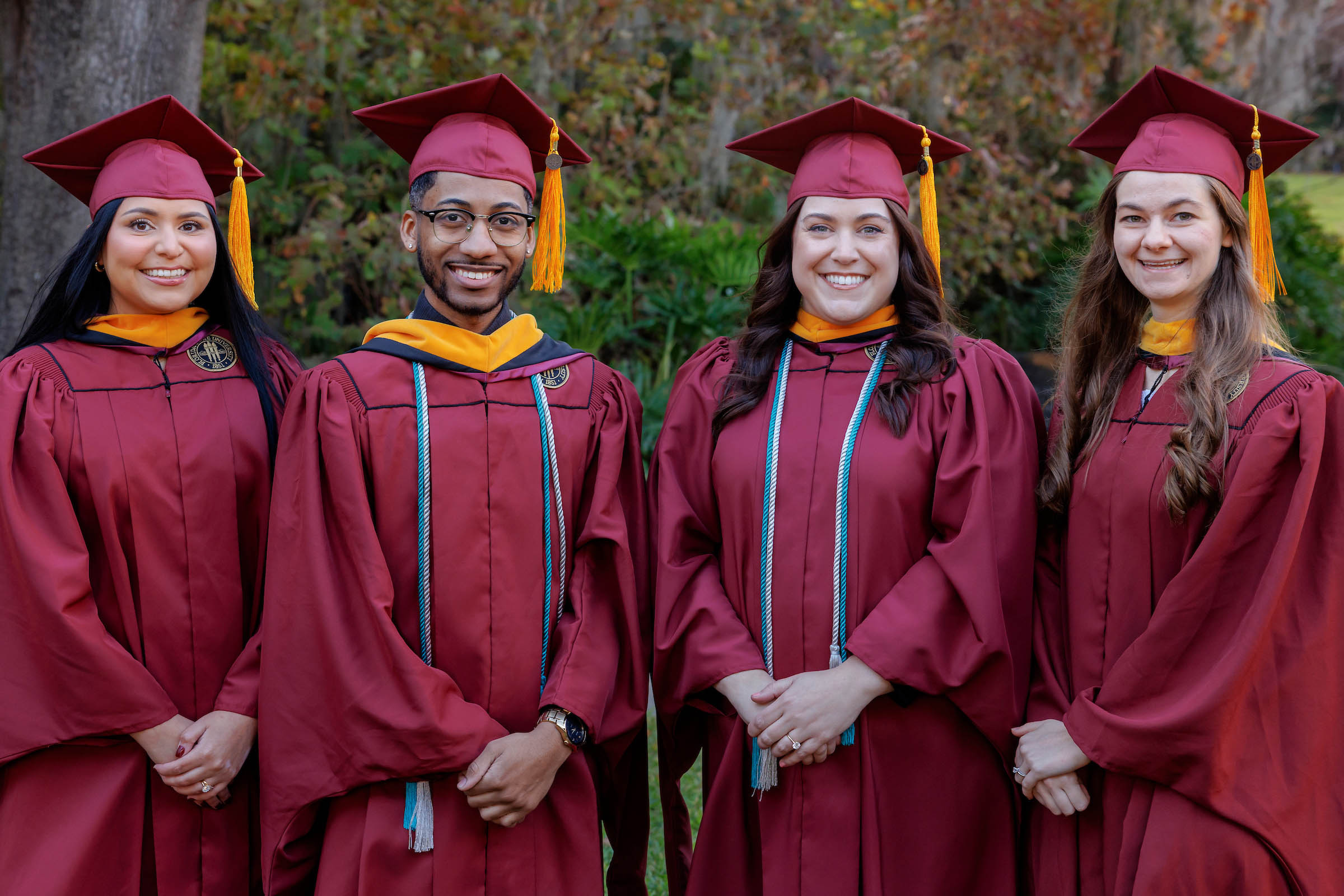Mission Accomplished! Sixth PA Class Graduates


The whirlwind, 27-month journey through the FSU College of Medicine’s School of Physician Assistant Practice culminated with Saturday’s Commencement Ceremony at Opperman Music Hall for the 59-member Class of 2024.
Graduates of the sixth class in the program’s history can now sit for the Physician Assistant National Certifying Examination (PANCE), where a passing mark is required before they begin practicing medicine.
Their presence in the health care workforce is sorely needed, especially in Florida, which is projected to have a shortfall of nearly 18,000 physicians by 2035. That figure was reported in 2023 following a study commissioned by the Florida Hospital Association and the Florida Safety Net Hospital Alliance.
Physician assistants, or PAs, can help stand in that void. They are trained to carry out many of the essential tasks, in roughly a third of the time it takes physicians to complete medical school and residency training.
“This is one of the biggest challenges we’ve ever faced,” Class of 2024 President Elijah Dorneval said, addressing his classmates and the audience. “It’s not for the faint of heart and it’s hard work. But it’s work that’s worth doing. My pastor back home once inspired me with some words I’d like to share with you all. ‘We may not know if we’re ready for everything, but we do know that we’re ready to help with anything.’”
With the successful completion of the PANCE, which Dorneval and many of his classmates will take next week, FSU’s PA program will have produced 314 providers since the program welcomed its first students in 2017.
“True to our mission, more than 70% of our graduates continue to serve communities in Florida,” College of Medicine Dean Alma Littles, M.D., said in her congratulatory comments. “Nearly a third of them are in primary care specialties and many of them are serving underserved communities.”
The class, which was drawn from approximately 1,700 applicants and arrived at FSU’s central campus in August 2022 to begin 15 months of didactic education, has undergone rigorous training. That includes the final 12 months in clinical rotations carried out at one of the college’s six regional campuses.
Benjamin Smith, program director and associate dean of the School of Physician Assistant Practice, used numbers to shine light on that rigorous training.
“As a class, you documented 106,007 hours in a clinical setting,” Smith said. “Individually, you averaged 1,796 hours. In addition, your class collectively documented 84,598 individual patient encounters, an average of 1,433 encounters per student.”
Smith also emphasized the importance of maintaining a humanistic approach to care, especially at a time when technology advances are changing rapidly in the medical field.
.
“While artificial intelligence [AI] aids in efficiency, AI does not replace who you are connecting with -- those that you will serve as a clinician,” Smith reminded the class. “Your human touch, empathy and sensitivity are absolutely vital when providing care.”

Not surprisingly, the class is well-represented by mission-driven graduates committed to patient-centered care, many of whom chose the profession as a response to the community needs they encountered.
Abigail Zamora was raised in Wauchula, a rural town in Florida’s Hardee County with a high population of migrant farmers and a lack of resources.
“These communities are without access to medically, cultural relevant care,” said Zamora, the second daughter of Mexican immigrant parents. “I always knew that, and me being privileged to speak Spanish and now going to PA School, these are the type of people and the type of communities I want to target and give back to.”
Born with a cleft lip, Zamora required multiple surgeries as an infant.
“There’s no specialists like that in Hardee County,” she said. “We always traveled to St. Petersburg and All Children’s Hospital.”
She was also forced to travel to Lakeland for required orthodontic work associated with her birth defect, and later to Orlando to see an endocrinologist.
“Luckily, my mom was able to do that for me, but there are a lot of people who don’t have the privilege to commute that far and access those type of appointments.”
Zamora is committed to serving similar populations as a PA somewhere near her husband’s job in the Tampa area.
Quincy native Hannah Cotton said her parents would drive to Tallahassee for their family’s medical needs, in large part because of the shortage of doctors in Gadsden County.
“My grandparents, they all live in Sneads, another very small community. They have to drive to Tallahassee or Dothan,” Cotton said. “I really do see the need for more providers to practice in more rural and underserved areas, so even if I don’t do that right out of the gate, one day that’s something I want to do.”
She will begin practice next month at Tallahassee Ear, Nose & Throat, while her husband, Joshua, a first-year medical student at FSU, completes his education. Their long view of the future includes medical mission work, perhaps abroad, which aligns with their strong faith that was further solidified when they met at Bryan College, a Christian liberal arts college near Chattanooga, Tennessee.
Dorneval will also begin his PA career locally with the Tallahassee Neurological Clinic. A Miami native, he earned his undergraduate degree from UCF in Orlando and spent time there trying to find his niche within medicine over the course of a couple of gap years.
“I knew I wanted to go into medicine,” he said. “Since childhood, I really loved helping people but since early in high school, I really fell in love with science.”
Becoming a PA wasn’t on his radar until he accepted an internship opportunity with a neurosurgeon based at the Orlando Regional Medical Center. There he met PA-C Blaire Burns in advance of shadowing a surgery.
“He just poured into me and told me about the profession,” said Dorneval, who was impressed with how Burns assisted the surgeon. “It really sparked my interest. I went home and started researching it and realized that might be my path.”
The path to FSU was not quite smooth, as he was initially “wait-listed” for a spot in the 2024 class and was working as a tech in a plasma center when he finally received the call. Dorneval quickly ascended to a position of leadership.
“I felt it was my responsibility to show that all the investments made in me were well worth it; that I’m here and I mean business,” he added. “The kindness that I received in the events leading up to and when I got here was just amazing.”
As journeys go, Candice Rhodes’ path to graduation is amazing in its own right. A 2012 graduate of the University of West Florida with a degree in biology, the Milton native planned to become a doctor.
Rhodes was working in the hospital system after graduation and “for various reasons, chickened out and never applied to medical school.” As a fallback, she followed a different calling – “I also wanted to be a teacher” – and spent four years teaching middle school math.
“In the midst of that time I watched my grandparents, three of them, become ill and pass away. I was very involved in their care and it kind of reignited that desire I had to practice medicine,” Rhodes said. “Through that experience with them and feeling, deep down, that I had given up on something that I wanted to do motivated me to pursue medicine again.”
Armed with more knowledge about medical professions the second time around, she thought becoming a PA was her best option. That path, however, was not without challenges.
“I had to take a lot of my prerequisite classes because of how old my degree was,” Rhodes said, anecdotally sharing an awkward encounter along the way.
“I was retaking my prerequisite classes the year before I was applying [to PA schools] and was in the library at UWF when I ran into one of the students from my first [class] when I taught seventh-grade math. That made me feel very old. She was in college.”
Saturday, she strode to center stage, was hooded and presented her diploma, a proud 35-year-old graduate of the School of Physician Assistant Practice’s UWF Pipeline Program.
“The Pipeline is the reason I chose to attend FSU,” Rhodes said. “Being able to do my entire clinical year in Pensacola was a huge selling point to me…My plan and my hope is to get a job in Pensacola, Pace or Milton in family medicine and really just build relationships with those patients and provide compassionate care to them throughout their lives.”
Contact Bob Thomas at robert.thomas@med.fsu.edu
Photo Caption, top right:
Moises Rafael Pichardo is hooded during PA Commencement Ceremonies on Dec. 14, 2024, at Opperman Music Hall. (Photo by Colin Hackley for the the FSU College of Medicine.)

